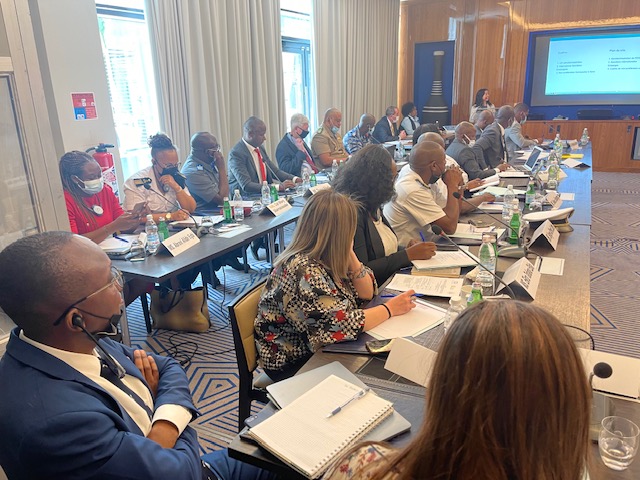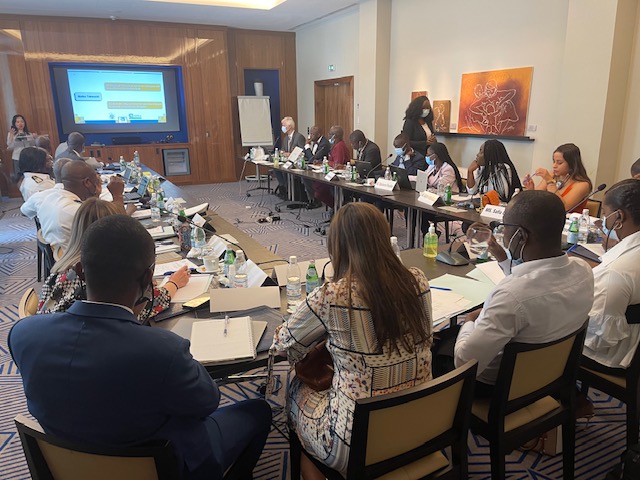Workshop on Maritime Security: « How to counter the practices used to evade UN maritime sanctions established against the proliferation of weapons of mass destruction and ballistic missiles »
The training workshop which opened at the Mövenpick Hotel in Abidjan, Côte d’Ivoire, on 05 April 2022, on the theme “How to counter the practices used to evade UN maritime sanctions established against the proliferation of weapons of mass destruction and ballistic missiles” ended on 06 April 2022.
Sponsored by the Export Control and Related Border Security (EXBS) programme of the US Department of State, as well as by the American Embassy in Ivory Coast, the two-day workshop was attended by more than twenty participants, including African Maritime Authorities, Port Managers, Shipping Companies, and other stakeholders, all from West, North and Central Africa.
Several themes were addressed, including cybercrime, dangerous goods, port security, illegal traffic, smuggling, etc.
Simulation exercises, based on maritime threat scenarios observed in recent years, were also put into practice by the participants.
According to Colonel Nasredine Kamel, Principal Administrator of Financial Services at the Ivorian Customs, “International maritime trade is growing and Africa has become a major player in recent years. Through the movement of goods, it is necessary to put in place instruments for the security of African coasts and to detect the illicit practices of countries under UN maritime sanctions. Financial and commercial transactions exist between countries under UN maritime sanctions and some African countries. The workshop gave us the means to monitor maritime operations on the African continent. We need to ensure good documentary control of ships and their characteristics. A good verification of the identity documents of the crew members, a good reading of the cargo manifest which describes the general state of the goods on board and their origins. Similarly, there must be a perfect partnership between the customs administrations and the private sector through an interconnection for the verification of financial data. All in all, these elements contribute to a good control of maritime operations and their surveillance for the arrest of ships carrying fraudulent goods.
For Colonel Yapo Marina, from the Ivorian Maritime Affairs, this training was very enriching and made him aware of the need to pay attention to all the information transmitted by the ships.
“Nothing should be overlooked. Inter-agency collaboration is paramount as well as inter-state cooperation is required to ensure the veracity of information provided by ships.”
“I was impressed with the module on cybercrime. I learned about the modus operandi of hackers and how important it is for ports or companies to make workers aware of the techniques used to attack systems and therefore have procedures in place to avoid or deal with possible attacks. Regular audits of the IT system are essential in this respect. With regard to the transport of dangerous goods, I have learned that as these are very sensitive cargoes, it is essential to make arrangements for their transport. These cargoes must be declared before transport and entry into a country. In the event of a discovery of illegal transport of radioactive hazardous materials, international and national authorities should be contacted to manage the repatriation and the repatriation should always be escorted. Hazardous materials must be handled with care to avoid accidents. In the context of monitoring the activities of countries under UN maritime sanctions, it is important to be aware of all the techniques used to circumvent these sanctions. The focus should be on ships flying flags of convenience, the name of the captain, the MMSI number, the IMO number, and the cargo carried (imported and/or exported),” she added.
“Beyond the issue of the embargo, this training workshop gives us reflexes to conduct investigations in the maritime field,” said Mr. DIARRASSOUBA Mory of the Ivorian National Gendarmerie.
Certificates were given to participants at the end of the training.





















